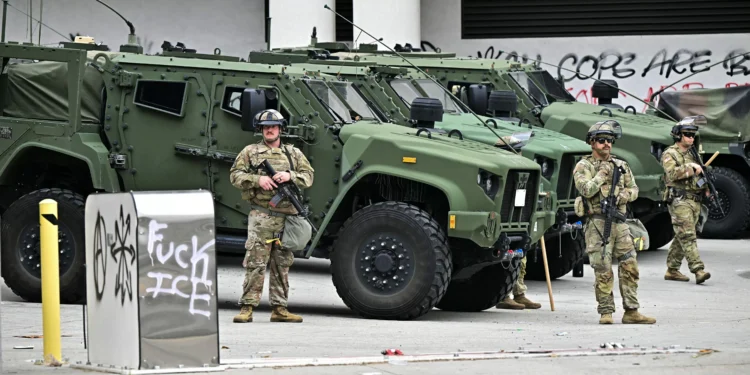The National Guard’s Response to Civilian Protests: Remembering the Tragedy of Kent State Massacre
The United States of America has a long history of protests and demonstrations, from the Civil Rights Movement to the Women’s March. These protests have played a crucial role in bringing about social and political change in the country. However, there have been instances where the government’s response to these protests has been met with violence and tragedy. One such incident that still haunts the nation is the Kent State massacre, where the National Guard’s response to anti-war protests resulted in the death of four students and injury of nine others.
As history tends to repeat itself, we are now faced with another disturbing decision by the government to deploy the National Guard to suppress anti-ICE protests. On June 1st, President Trump announced his plans to mobilize the military to “dominate the streets” and “quell the protests” against police brutality and racial injustice. This decision has sparked outrage and fear among the citizens, as it reminds us of the deadly consequences of using force against peaceful demonstrations.
The National Guard, also known as the citizen soldiers, has a long-standing history of serving the nation during times of war, natural disasters, and civil unrest. However, their involvement in civilian protests has been a controversial and deadly one. The most significant and tragic example of this was the Kent State massacre in 1970.
On May 4th, 1970, students at Kent State University in Ohio organized a protest against the expansion of the Vietnam War into Cambodia. The demonstration was peaceful, but tensions rose when the National Guard was called in to disperse the crowd. The soldiers fired tear gas and later opened fire on the unarmed protesters, resulting in the death of four students, including two who were not even part of the demonstration. This horrific incident shocked the nation and sparked massive anti-war protests across the country.
The Kent State massacre was a dark moment in American history, where the government’s response to peaceful protests resulted in the loss of innocent lives. It was a blatant abuse of power and a violation of the First Amendment rights of the citizens. The National Guard, whose primary role is to protect the people, had instead turned against them, causing a deep divide and eroding trust between the government and its people.
Fast forward to 2020, and we are faced with a similar situation. The government’s decision to deploy the National Guard to suppress anti-ICE protests is a dangerous and concerning move. It not only undermines the rights of the citizens to peacefully assemble and protest but also puts their lives at risk. The recent protests against police brutality and racial injustice have been predominantly peaceful, and the use of military force against them is unnecessary and uncalled for.
Moreover, the timing of this decision is also questionable. The country is already going through a health crisis and economic turmoil, and the deployment of the National Guard will only add to the chaos and division. It is a clear attempt to silence the voices of the people and divert attention from the pressing issues at hand.
As citizens of a democratic nation, it is our fundamental right to protest and speak out against injustice. The government’s decision to suppress these protests with military force is a violation of our rights and a threat to our democracy. We must remember the tragedy of Kent State and not repeat the same mistakes. History has taught us that violence begets violence, and we must find peaceful and effective ways to bring about change.
In conclusion, the National Guard’s response to civilian protests has a deadly history, and it is our responsibility to learn from it. The decision to deploy the military to suppress anti-ICE protests is a dangerous move that goes against the values and principles of our nation. We must stand united and demand for a peaceful and just resolution to the ongoing issues in our country. As Martin Luther King Jr. said, “Injustice anywhere is a threat to justice everywhere.” Let us not forget the lessons of the past and work towards a better and more equitable future for all.






